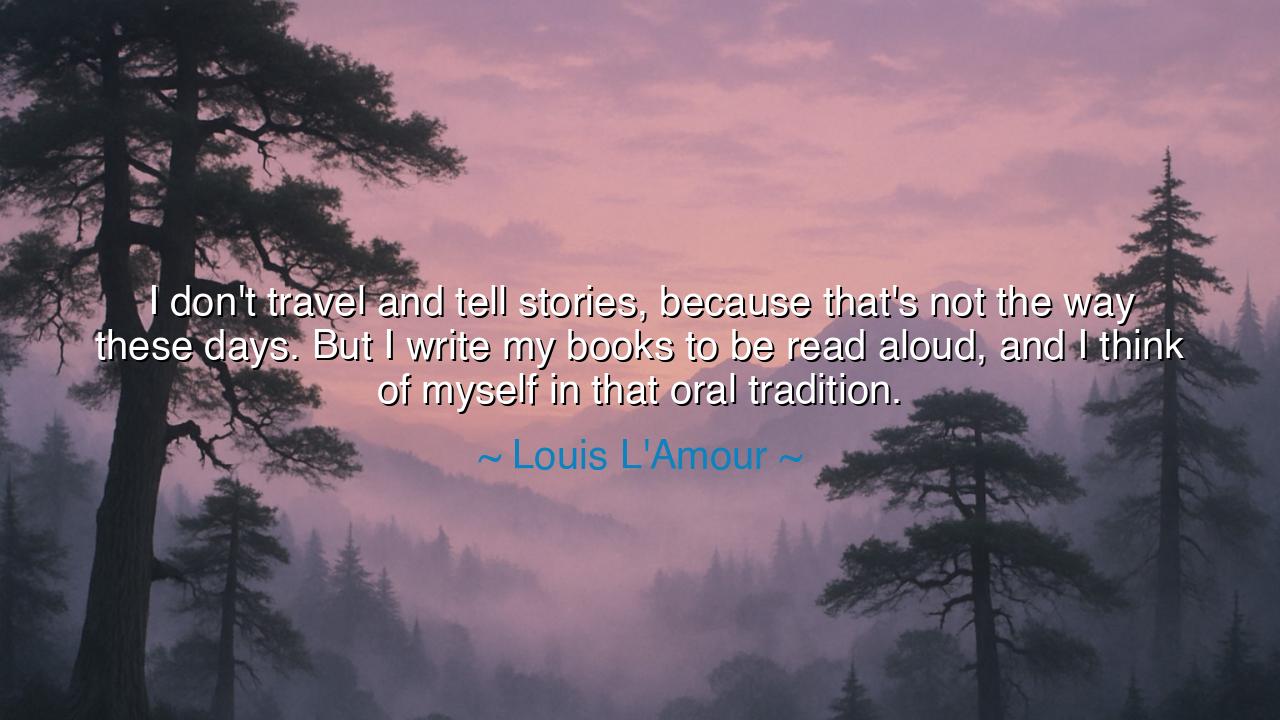
I don't travel and tell stories, because that's not the way
I don't travel and tell stories, because that's not the way these days. But I write my books to be read aloud, and I think of myself in that oral tradition.






The words of Louis L’Amour rise like an echo from the campfires of forgotten ages: “I don’t travel and tell stories, because that’s not the way these days. But I write my books to be read aloud, and I think of myself in that oral tradition.” In these words is not only the reflection of a single writer’s craft, but the invocation of humanity’s oldest art—the telling of stories from mouth to ear, from heart to heart. For before there was parchment or print, before ink stained scrolls or presses thundered, there was only the voice, carrying wisdom and wonder into the night.
In the ancient days, stories were the lifeblood of a people. They were not mere entertainments but sacred vessels of memory, identity, and truth. Around the fires of the desert tribes, elders recited the genealogies of their fathers. In the halls of the Norse, skalds sang of Odin and Thor, and in the mountains of Greece, bards invoked the muses and gave birth to epic. This is the oral tradition that L’Amour honors, a tradition in which the spoken word was not just sound but power—living, fleeting, and eternal all at once.
Consider the tale of Homer, whose verses of the Iliad and Odyssey were first sung, not written. For generations they lived only in the breath of bards, passed down by memory and recitation, shaping the Greek soul. No scroll, no tablet carried those words in their earliest days—only the living human voice. Thus when L’Amour writes his books to be read aloud, he is not abandoning modernity, but rekindling the flame of this very heritage. He acknowledges that while the world has changed, the human ear, the human heart, still longs for words carried by the breath of another.
The meaning of the quote is not merely about form, but about connection. To write with the ear in mind is to write for fellowship, not solitude. It is to craft words not as silent symbols, but as rhythms meant to awaken the imagination in a shared moment. A written page can be lonely, but a spoken tale binds people together—listener and speaker caught in the same spell, their souls woven into one fabric. In this way, L’Amour claims kinship with the bards, the griots, the shamans, who saw storytelling as an act of communal power, not private indulgence.
And yet, he admits the change of times. Once, storytellers wandered from village to village, bringing news, wisdom, and delight. Today, such wandering is rare, for books and screens now carry voices further than a traveler’s feet ever could. But though the mode has changed, the essence remains. The storyteller still wanders—only now he wanders through the imagination of his readers, who speak his words aloud and in doing so, summon his presence into their homes and hearts.
The lesson here is profound: in a world flooded with words, never forget the power of the spoken story. Families who read aloud together bind themselves with invisible threads of memory. Teachers who recite instead of merely assigning awaken their pupils. Friends who share tales by voice turn mere text into shared life. And for the individual, to read aloud—even when alone—is to awaken the body, the breath, and the spirit to the music of language.
Therefore, let this wisdom guide you: Honor the oral tradition in your life. Do not let your words remain caged upon the page. Speak them, share them, breathe them into existence. Tell your children the old tales. Tell your friends the stories of your ancestors. Tell your own story aloud, so that it may find form not only in silence but in sound. For in the end, what survives is not ink alone, but the living voice—the eternal bridge between souls across time.






AAdministratorAdministrator
Welcome, honored guests. Please leave a comment, we will respond soon